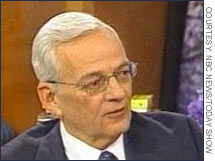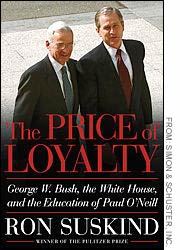WASHINGTON (CNN) -
Ex-Treasury Secretary Paul O'Neill said Tuesday he doesn't believe he gave classified documents to the author of a new book about the Bush administration, but said he wished he could take back unflattering comments he made about President Bush.
 |
|
| Former Treasury Secretary Paul O'Neill on NBC's Today show. |
O'Neill gave author Ron Suskind two compact discs containing 19,000 documents from his 23 months as Bush's Treasury chief. O'Neill said the records were given to him by the department's lawyers, who should have removed any classified material.
"I don't honestly think there's anything that's classified in those 19,000 documents," O'Neill told NBC's "Today."
The Treasury Department said Monday it had asked its inspector general to determine if there should be an investigation into whether any classified material was improperly released to O'Neill.
O'Neill said he didn't believe the Treasury probe is payback for his public break with his former colleagues.
A document said to contain plans for "post-Saddam Iraq," and marked "secret," was shown during an interview on the CBS program "60 Minutes" that aired Sunday night. But O'Neill said the page displayed was only a cover sheet, not the classified document itself.
 |
|
| Simon & Schuster issued a statement saying, "We stand behind the book. Ron Suskind has acted responsibly and properly." |
A senior Treasury official said career lawyers recommended referring the issue to the department's inspector general based on the appearance of the "secret" document on CBS. The referral did not specifically seek an investigation, which is a decision left to the inspector general's office, the official said.
O'Neill told NBC that he would have ordered an investigation himself under the circumstances.
O'Neill was asked to resign after opposing some Bush economic policies. But on some critical economic issues, some of O'Neill's more infamous gaffes have come close to being justified -- including his views on the U.S. dollar, steel tariffs and tax cuts.
Book hits the stores
Suskind's book, "The Price of Loyalty: George W. Bush, the White House and the Education of Paul O'Neill," was published Tuesday. It has drawn attention in large part because O'Neill said Iraq was on the president's agenda from his first days in office.
| More on the controversy
|

|
|
|
|
But O'Neill said his comments have been distorted to suggest last year's invasion of Iraq was being planned from the beginning of the administration.
"I was surprised, as I've said in the book, that Iraq was given such a high priority," he told NBC. "But I was not surprised that we were doing a continuation of planning that had been going on and looking at contingency options during the Clinton administration."
In the book, Suskind says that O'Neill -- the former CEO of aluminum producer Alcoa (AA: Research, Estimates), who sat on the National Security Council as treasury chief -- told him, "From the start, we were building the case against Hussein and looking at how we could take him out and change Iraq into a new country. And, if we did that, it would solve everything. It was about finding a way to do it. That was the tone of it -- the president saying, 'Fine. Go find me a way to do this.' "
| 
| |

| 
| 
|

|
 Ex-Treasury Secretary Paul O'Neill says he didn't give classified documents to the author of a new book. CNNfn's Louise Schiavone reports. Ex-Treasury Secretary Paul O'Neill says he didn't give classified documents to the author of a new book. CNNfn's Louise Schiavone reports.
|
 Play video
Play video
(Real or Windows Media)
|
| 
|

|
|
A senior administration official told CNN that early Bush administration discussions regarding Iraq were aimed at reviewing existing policies and plans -- particularly regarding enforcement of "no-fly" zones over northern and southern Iraq, where Iraqi air defense forces had been taking potshots at U.S. and British warplanes since late 1998.
In July 2001, National Security Adviser Condoleezza Rice told CNN that Saddam "is on the radar screen for the administration," and senior officials met at the White House two days later to discuss Iraq. During the same time period, Iraq began dispersing aircraft and air defense capabilities in preparation for more aggressive U.S. airstrikes to enforce the "no-fly" zones over northern and southern Iraq.
Regrets about 'blind' remark
O'Neill also told NBC that he hoped his description of Bush and his Cabinet in the book as "a blind man surrounded by deaf people" did not overshadow the rest of the book.
"I used some vivid language that if I could take it back, I'd take that back, because it's become the controversial centerpiece," O'Neill said. But he said he hoped people still read Suskind's book, which he said illuminates "a bipartisan, broken political process."
Bush's allies have rallied to his defense since O'Neill's comments became public.
"The way he describes the president is not the president that I see in action -- certainly not the president I've been fortunate enough to be exposed to in meetings," Republican National Committee Chairman Ed Gillespie said Tuesday. "So his assessment is at odds with not only those who work for him now, but those who have worked for him in the past."
A senior administration official told CNN Tuesday that Defense Secretary Donald Rumsfeld had two discussions with O'Neill about his potential participation in a book about the Bush administration.
The official wouldn't say specifically whether Rumsfeld advised O'Neill against being interviewed, but the official said, "the secretary offered O'Neill the benefits of his views on these types of memoirs."
The official noted that Rumsfeld and O'Neill have known each other for over 30 years. The defense secretary was not sent to talk to O'Neill, but did it on his own, the official said. The second conversation took place after Rumsfeld heard more details about the project. The official could not say when or where the conversations happened.
Federal Reserve Chairman Alan Greenspan, who is mentioned several times in the book, declined comment about the remarks by someone he called "his old friend" during an appearance before the Bundesbank in Berlin.
Several Democratic presidential candidates seized on O'Neill's comments to argue that the Bush administration misled Americans about the need for war with Iraq, where nearly 500 American troops have been killed since March.
Bush repeated his argument Monday that his administration turned to war with Iraq only after the Sept. 11, 2001, attacks on New York and Washington changed the way U.S. officials viewed Baghdad's suspected weapons programs.
O'Neill's tenure at the Treasury Department ended after he opposed the tax cuts Bush pushed through Congress last year. Though he lobbied for earlier tax cuts, he said the country will pay an "enormous" price for the 2003 act "because it reduces our fiscal flexibility to fix Social Security, which we desperately need to do."
"With the profound changes we've now made, and the president urging we make them permanent, we're going to have a very difficult time finding the money to do a fundamental fix of Social Security," O'Neill said. "And I thought that was a more compelling need."

|

